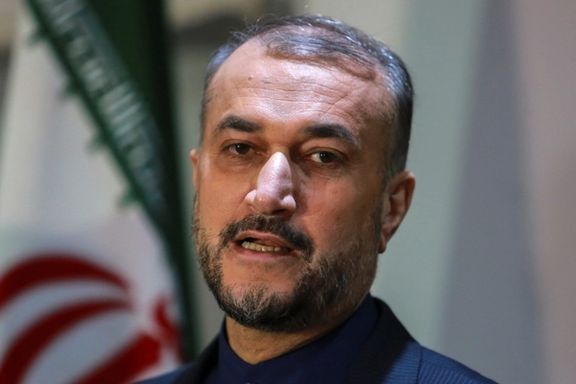Iran Says IRGC Sanctions A Main Issue In Nuclear Talks

Iran's foreign minister on Saturday said removing the Revolutionary Guard (IRGC) from the list of US sanctions is one of the main issues in nuclear talks.

Iran's foreign minister on Saturday said removing the Revolutionary Guard (IRGC) from the list of US sanctions is one of the main issues in nuclear talks.
In an interview with state television Saturday, Hossein Amir-Abdollahian said that removing individuals and entities from "the US red list and list of unilateral sanctions, such as certain holdings and state entities, as well as the IRGC" is one of Iran's main issues in the Vienna talks to restore the 2015 nuclear deal, Joint Comprehensive Plan of Action (JCPOA).
Some had suggested that perhaps Washington would agree to remove the IRGC from its Foreign Terrorist Organization (FTO) list but keep existing sanctions on individuals and entities affiliated with. But the Iranian foreign minister’s remarks show Tehran also wants companies, banks and persons to be removed from any sanction’s designation.
Amir-Abdollahian also accused the US of making "excessive demands" which, he said, have hindered the negotiations. He said he has discussed these issues with the EU foreign policy chief, Josep Borrell, and told him that Iranians could also "make demands".
"Regarding the IRGC, what is important is to acknowledge the standing and the central role of the IRGC in our security and defense. [Negotiators] relayed some messages to the US," he said.
Amir-Abdollahian also claimed that senior Revolutionary Guard officials always tell the government that it should do whatever it deems necessary to secure the country's national interests and not to prioritize the issue of the IRGC. "This is self-sacrifice on the part of the IRGC."
He added that despite having the "permission" from the IRGC authorities not to pursue the matter, the government continues to consider the removal of the military force from the US list of terror organizations a "major issue" in the talks.
This was the first time Amir-Abdollahian clearly referred to IRGC terror listing as a main issue in the talks. At a meeting with the Lebanese Parliament Speaker Nabih Berri in Beirut.
On Thursday the foreign minister said Iran would not surrender its "redlines" in the Vienna talks. But he did not explain what the redlines were and made no mention of the issue of the IRGC issue.
The Trump administration listed the IRGC as a terrorist organization as part of his ‘maximum pressure’ after he withdrew from the JCPOA in 2018.
Prospects of delisting the IRGC have raised many objections in the US and the tone in Washington is no longer as optimistic as before regarding the success of the talks. Friday’s large-scale and destructive Houthi drone and missile attacks on Saudi Arabia’s oil facilities in Jeddah is bound to make it less likely for the Biden Administration to entertain the idea of making concessions regarding the IRGC.
Amir-Abdollahian reiterated that the talks have made great progress on lifting the US sanctions and that an agreement is within reach if the Washington "adopts a realistic approach".
Referring to recent controversies over Russia's demand to be exempted from US sanctions over Ukraine in its economic dealings with Iran, Amir-Abdollahian said China and Russia are "for an agreement".
Deputy EU Foreign Policy Chief Enrique Mora arrived in Tehran Saturday for talks to explore possible solutions to remaining disagreements. He will reportedly visit Washington after later to confer with US officials.
In a Twitter post Friday, Mora said he would hold talks with Iran’s lead negotiator Ali Bagheri-Kani during his visit to Tehran as part of efforts towards “closing the remaining gaps” in the Vienna talks. "We must conclude this negotiation. Much is at stake," he wrote.